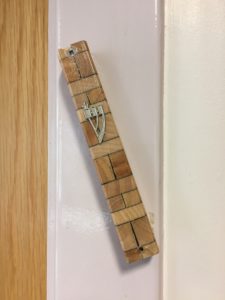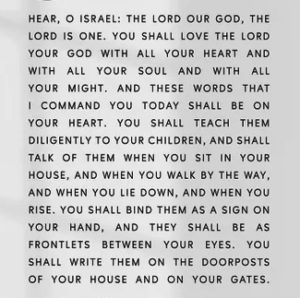As seen in my Article on How and Why Jews Pray, prayer is of supreme importance within Judaism as a way to communicate with God.
Jews have prayers for virtually every occasion and situation however there is one called the Shema (pronounced Sh’MA – emphasis on last syllable) which is the most important of all.
The Shema is found in the Book of Deuteronomy Chapter 6, verses 4-9. The word Shema means ‘hear’ or ‘listen’ and the first couple of lines encapsulate the whole ethos of Judaism- ‘Hear O Israel the Lord is our God, the Lord is One. And you shall love the Lord your God with all your heart, all your soul and all your might.’
There then follows a response – ‘Blessed be His name, whose glorious kingdom is forever and ever’ (originally a Rabbinic addition) which is recited silently by Orthodox Jews but aloud by Progressive Jews.
The Shema then tells us to teach these words to our children and say them throughout the day. It also mentions the use of Tefillin (prayer boxes) – ‘You shall bind them (these words) as a sign on your hand and wear them as a symbol on your forehead’.
Finally it tells us to write these words on the doorposts of our houses. This is why Jewish homes have a Mezzuzah on the front door and often inside too on every door except the bathroom. (It is thought to be inappropriate for it to be near people who are undressed). We touch or kiss the Mezzuzah when we go in and out of the house which reminds us to say the Shema.

The Shema is traditionally recited as one’s last words before death.
